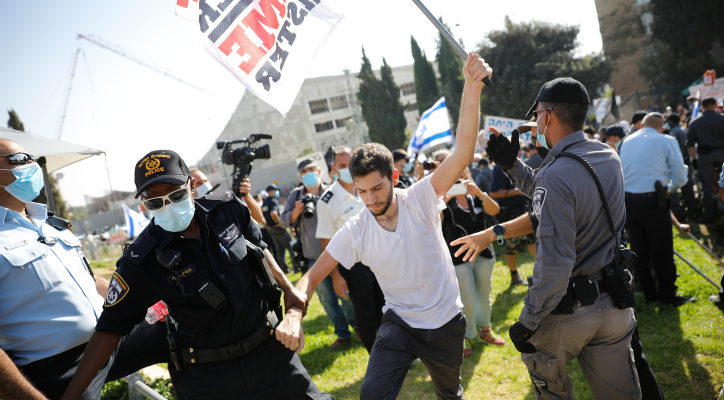Government says law is to protect from coronavirus spread, opposition slams move as blow to democracy.
By Paul Shindman, World Israel News
Following a raucous all-night debate the Knesset early Wednesday passed an amendment to emergency regulations and banned large protests during Israel’s national coronavirus lockdown – effectively halting the daily large protests against Prime Minister Netanyahu.
The legislation was finally voted in at about 4:30 a.m., putting protests under the list of activities restricted by health regulations during the coronavirus crisis. Protests are now reduced to a maximum of 20 people within one kilometer of their place of residence.
The government said the measure was needed to help stop the uncontrolled spread of the virus that has put Israel in the embarrassing position of having one of the world’s worst rates of infection after the country had successfully stopped the first wave of coronavirus in the spring.
Critics of the move said its sole purpose was to shut down the months-long protests that had drawn thousands to the central Jerusalem streets near Netanyahu’s official residence, calling for his resignation over outstanding criminal charges against him and the government’s mishandling of the coronavirus crisis. Protest organizers claimed there was no proof that the outdoor demonstrations had been linked to any large outbreaks.
“It is a black day today for the State of Israel,” tweeted opposition Yesh Atid party member Ram Ben Barak. “Today, the Knesset of Israel banned demonstrations against government policy.
This day will be remembered forever. It will take a long time to correct if we are ever able to return to what was the only democracy in the Middle East.”
One of the protest leaders, Amir Haskel, said the Jerusalem demonstrations “are not over” and that protesters living nearby would maintain a vigil.
“We will all return there again,” Haskel told Israel Army Radio.
The Movement for Quality Government said it filed an appeal to the Supreme Court requesting the law be rescinded, saying the rejection of compromises that would have allowed smaller protests to continue was “proof that health or epidemiological motives do not form the basis of this legislation at all, but a sweeping ban on protest against the government and [Netayahu] who stands at its head.”
“The State of Israel crossed another red line of the trampling of the most basic rights of the citizen in a democratic state. We hope that the High Court will accept our petition and order a delay in the entry into force of the amendment,” said the movement, which was formed in 1990 to fight government corruption.
Public opinion polls over the past months have shown a steady decline in the public’s confidence in Netanyahu‘s handling of the pandemic as infection rates rose unabated.
On Friday, Netanyahu announced a two-week lockdown to slow the spread of the virus over the Yom Kippur and Sukkot holidays. However, on Tuesday Netanyahu and other senior officials said that massive numbers of serious ill patients and continued high infection rates would require the lockdown to continue for a month or longer, slowing the infection rate but also muting the anti-government protests.





